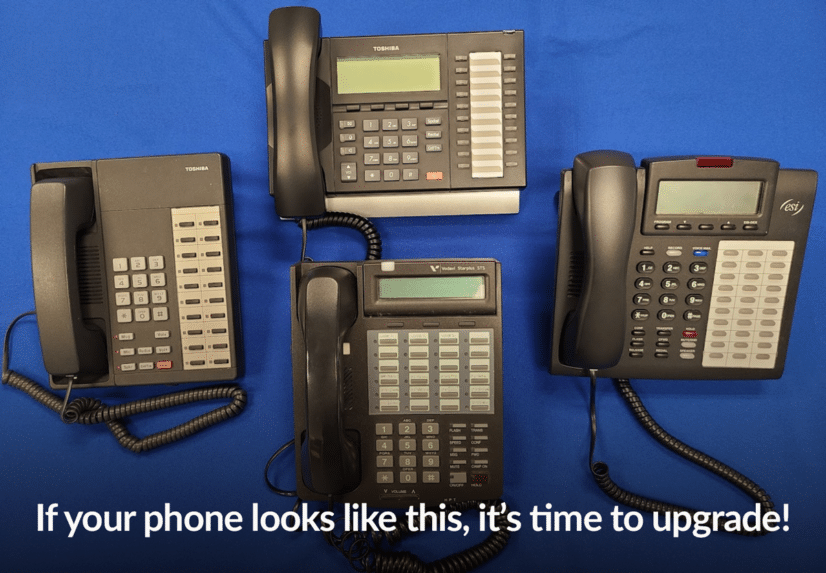At this point, it’s a cliche to say that the COVID-19 pandemic was a game-changer, however, we’re still seeing the myriad ways in which the pandemic has exposed frailties in modern business.
During COVID, business communication has been more crucial than ever, and it’s been changing. Companies unable to use communication to overcome social distancing and other mandates were at a massive disadvantage when it came to workplace collaboration and interacting with clients. Companies that thrived particularly during the early days of the pandemic leaned on digital and cloud-based Unified Communications technology.
With many companies switching to full-remote or hybrid situations, legacy on-premise phone systems were exposed as woefully inadequate. A legacy phone system also holds back growing companies. Adaptability and agility become crucial during growth, and expansion is difficult to sustain using systems that maintenance demands.
Many organizations are finding success by upgrading to a cloud-based phone service. This system is based on Voice Over Internet Protocol (VoIP), which is a technology that translates sounds into digital information that can be sent over the Internet to a receiver.
VoIP technology has been used for many years and is extremely reliable. More recently, VoIP systems have been hosted in the cloud by a service provider, as opposed to using on-premise hardware. Users of a cloud-based phone service can access it on any internet-connected device, including laptops, mobile phones and tablet computers. Many VoIP providers also offer conventional desktop phones.
A business that uses a cloud-based phone service doesn't need to buy any new equipment or subscribe to new Internet services. In fact, VoIP systems can sometimes integrate with a company’s existing hardware and software.
Most cloud-based phone systems also provide a number of modern features that legacy phone systems do not. They also can offer more flexibility, lower costs and more business benefits.
The Benefits of Upgrading to a VoIP System
Perhaps the biggest problem with legacy phone systems is that they do not scale up as a business grows. A successful business may add more employees, expand its facilities, add new office locations and even extend itself into other countries. Expanding a legacy phone system as a company expands requires the purchasing of new hardware and the expansion of telephone infrastructure.
On the other hand, a cloud-based phone service can easily scale up as businesses grow. Adding new lines may not even require the addition of new hardware and most cloud-based systems simply have an “add new line” function placed within the system control panel.
Legacy phone systems also don't integrate well with mobile. With a cloud-based system, there is no distinction between a landline and a mobile line. Cloud-based systems also come with additional features that are becoming essential to modern business, including audio conferencing, instant messaging, voicemail-to-text, call forwarding and virtual assistants.
These features and other functions are built to integrate with popular applications. This lets on-the-go employees have complete functionality as they travel as if they were still located within the workplace. This level of interoperability also helps the entire workforce of a company be more productive.
Unlike static legacy systems, cloud-based telephone systems are constantly being updated and upgraded by service providers. This means a cloud-based system will evolve as the technology around it evolves. That also means that a cloud-based system can adapt to quickly shifting needs, such as an increased reliance on remote technology brought on by the COVID pandemic.
According to reports, the pandemic considerably accelerated the adoption of cloud technology. In response, many companies are now adopting the cloud-first approach to their workplace. Most people already knew about the flexibility offered by the cloud, but the pandemic showed cloud systems are as secure and efficient as on-premise technology.
A cloud-based phone service can also provide a wealth of data and business insights. Online dashboards allow management and IT departments to maintain the system and track its use. These dashboards show data on call times, feature configurations, costs and work orders. This level of transparency protects against unpleasant surprises and helps to address growing problems. It also helps businesses extract more value from their investments in communications.
Finally, switching to a cloud-based phone service can considerably lower costs. In addition to being less in hardware and maintenance than legacy phone systems, a cloud-based communications platform allows a company to select and pay for only the functions that it needs. On top of that, a VoIP system saves money by increasing productivity, communication and collaboration.
Why Taylored Systems Should Be Your Choice for an Upgrade
At Taylored Systems, we’ve helped many companies make the transition to a modern cloud-based phone service. Our customizable solutions are focused on providing dramatic savings, adaptability and a competitive edge. Please contact us today to get a quote, schedule a demo or find out more about how we can assist your organization.

